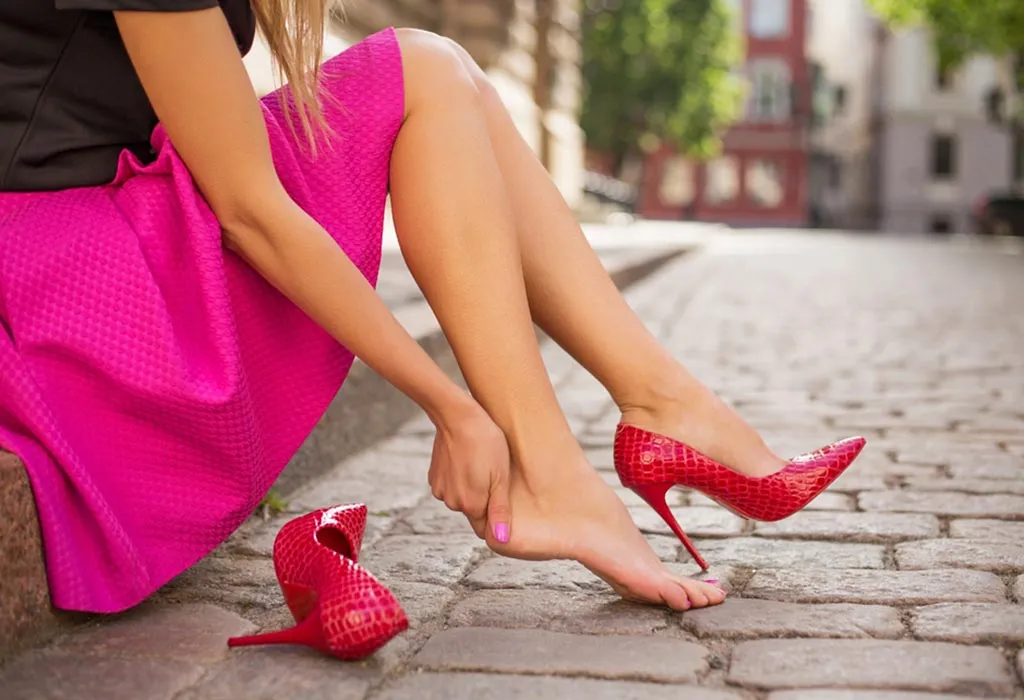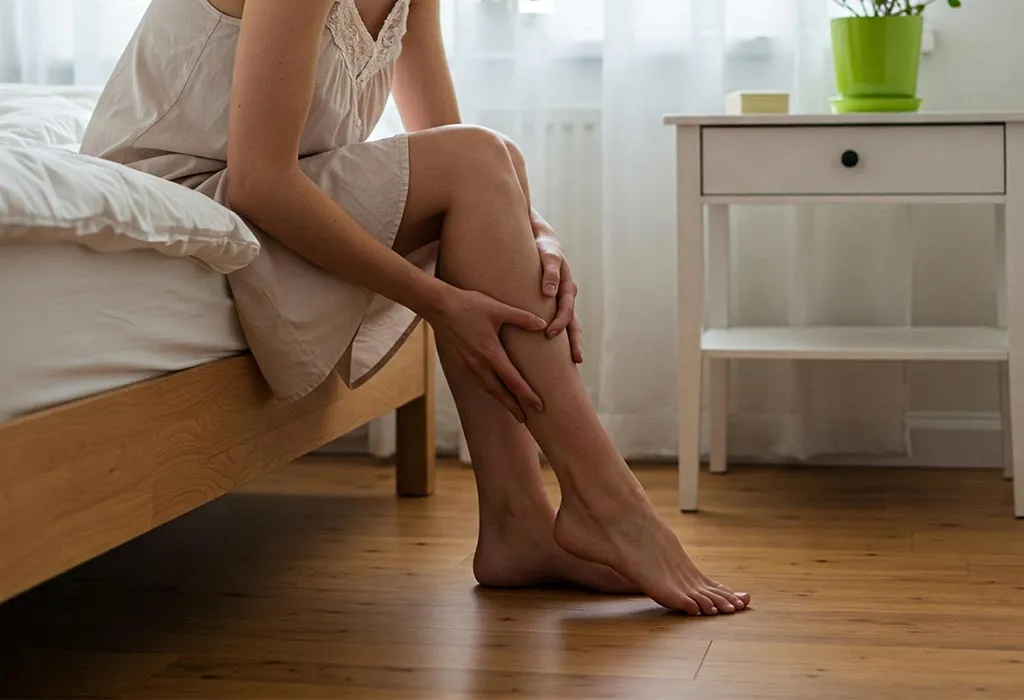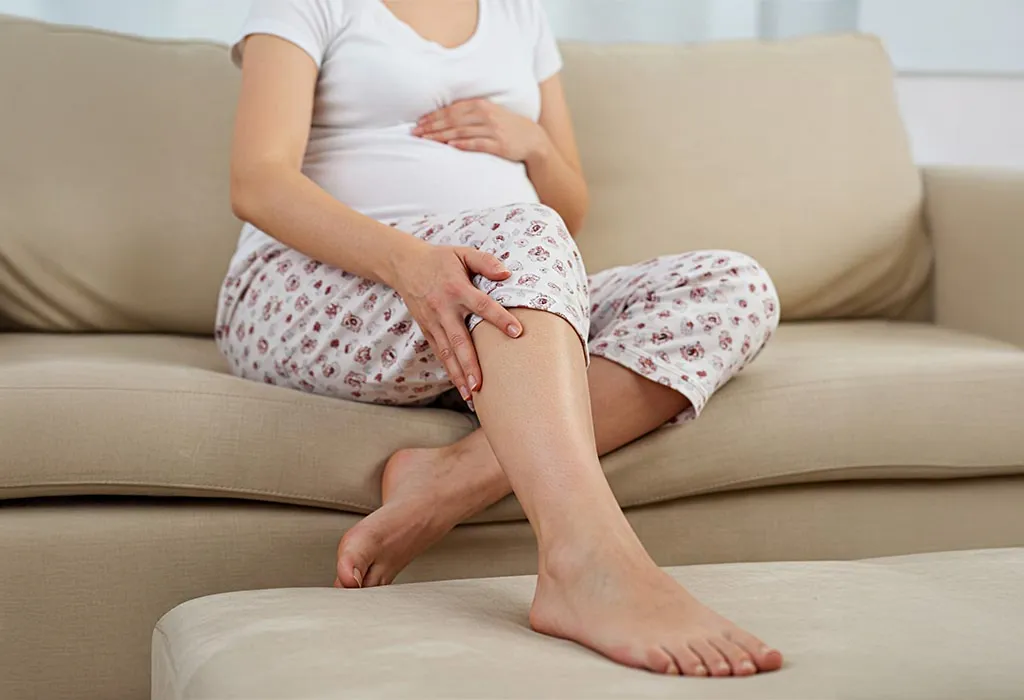Wearing High Heels During Pregnancy – Is It Safe?
- Can Pregnant Women Wear Heels?
- Risks of Wearing Heels During Pregnancy
- Are There Any Benefits of Wearing Heels in Pregnancy?
- Alternatives to Wearing Heels When Pregnant
- Safety Tips for Wearing Heels During Pregnancy
- FAQs
Many women love to wear heels, but they are advised not to wear them during pregnancy. Most doctors also opine that heels and pregnancy don’t go hand-in-hand and strongly suggest women shun them during pregnancy due to the risks associated with wearing heels. The expectant mothers who are not sure if they should or shouldn’t avoid their heels will find this article helpful. Here, we will talk about the potential risks of wearing heels and also share some tips to ensure your and your baby’s health if you do want to wear your favourite pair on a special occasion.
Can Pregnant Women Wear Heels?
Pregnant women can wear heels occasionally, but it’s generally not recommended, especially as pregnancy progresses. High heels can shift the center of gravity, increasing the risk of falls due to looser ligaments and balance changes caused by pregnancy hormones. They may also contribute to back pain, leg discomfort, or swollen feet, which are common during pregnancy. If wearing heels, opt for shorter, stable styles with good arch support and avoid prolonged use.
Risks of Wearing Heels During Pregnancy

Here are some of the risks that come with wearing high heels during pregnancy:
1. Cramps in the Calf
Wearing heels contracts the muscles in the calf and puts a strain on them. This leads to cramping in the calves, which may worsen during pregnancy (1).

2. Back Pain
Heels are meant to alter the posture and give women a rounder and more defined back. This happens because high heels cause the pelvic muscles to bend forward. As you will have gained some weight during pregnancy, this change in posture will put a lot of stress on your back and cause pain. Pregnancy also loosens the ligaments of the legs and the lower back (2). Since heels put a lot of pressure on the back and the pelvis region, these ligaments will not be able to support them, which will lead to a lot of pain in the back.
3. Loss of Balance
Pregnancy weight, in addition to the hormonal changes in the body, can weaken your ankles, which may lower your ability to balance your body (3). Wearing high heels can further affect your balance and make you more susceptible to tripping and falling over. This can cause unnecessary injuries to you and even to your developing baby.
4. Swollen Feet
Due to excess water retention in the body, you may find that your feet, ankles and even your legs swell up quite a bit (4). This can make walking or standing for a long time difficult. Wearing high heels during this time can only aggravate your pain as it will cause more fluids to accumulate in your feet.

5. Reduced Blood Circulation
Wearing heels can compress blood vessels in the feet and legs, restricting circulation. During pregnancy, when swelling and varicose veins are common, this can lead to increased discomfort, numbness, or even dizziness.
6. Strain on Pelvic Floor Muscles
High heels tilt the pelvis unnaturally, putting extra pressure on the pelvic floor—a group of muscles already under stress during pregnancy. This added strain may contribute to pelvic pain or even worsen conditions like diastasis recti or incontinence (5).
So, clearly, there are several risks associated with wearing high heels during pregnancy. But, if you do want to wear your favourite pair for a special occasion, you may want to give the safety tips given below some consideration.
Are There Any Benefits of Wearing Heels in Pregnancy?
While most medical experts advise against wearing heels during pregnancy due to safety and comfort concerns, some women may still choose to wear them occasionally for special occasions. If done cautiously—with the right heel type and for short durations—there may be a few minor benefits as below.
1. Boosts Confidence and Mood
Pregnancy can bring changes in body image, and some women feel more confident and stylish in heels. Wearing them occasionally for a short time may provide a psychological lift, helping maintain a sense of normalcy and self-expression.
2. Improves Posture (Temporarily)
A well-designed, low-to-moderate heel with proper arch support can encourage better posture by aligning the spine—as long as it’s worn briefly. However, this benefit is short-lived, as prolonged wear can lead to strain.
3. Enhances Outfits for Special Occasions
For formal events or photoshoots, heels can complement certain outfits better than flats. Opting for chunky, stable heels (under 2 inches) for limited periods may allow for both style and relative safety.
4. Strengthens Calf Muscles (Minimally)
Very short periods in low heels might engage calf muscles slightly more than flats. However, this is not a significant benefit, and overdoing it can lead to cramps or discomfort.
Alternatives to Wearing Heels When Pregnant
While heels may be tempting for special occasions, there are plenty of stylish and supportive alternatives that reduce strain on your body. These options keep you looking polished while protecting your changing posture, balance, and circulation (6).
1. Supportive Flats with Arch Support
Opt for cushioned, ergonomic flats designed with arch support to prevent foot fatigue. Look for brands specializing in comfort footwear, as they provide stability without compromising style.
2. Low Wedges (1-2 Inches)
If you want a slight elevation, choose wedges with a sturdy, wide base. They distribute weight more evenly than stilettos and reduce pressure on your feet and back.
3. Slip-on Loafers or Mules
Easy to wear and remove, these shoes offer a chic, effortless look while accommodating swollen feet. Select soft, stretchy materials with non-slip soles for added safety.
4. Orthopedic Sandals (For Warmer Weather)
Some brands offer stylish sandals with contoured footbeds that support your arches and reduce swelling, ideal for pregnancy comfort.
5. Ballet Flats with Stretchy Uppers
Flexible materials (like elastic or soft leather) adapt to foot changes, while a slight, supportive sole keeps you comfortable for longer periods.
Safety Tips for Wearing Heels During Pregnancy
Despite the risks, if you still want to wear high heels during pregnancy, you might want to keep the following tips in mind:
- If you’re up for it, you may wear heels in the first trimester. However, avoid wearing them beyond your first trimester as it could affect your and your baby’s health. This is because your body goes through hormonal changes, and the muscles in the feet begin to stretch. Even in the first trimester, wear only shorter and sturdier heels that allow you to walk comfortably.
- Skip wearing stilettos or shoes with thin and pointed heels. These heels will not be able to give you any support and will affect your balance, more so during pregnancy. Instead, you can opt for block heels or wedges that provide better support and balance to your body. Since you will put on some weight during pregnancy, your centre of gravity will shift and walking in heels during this time can affect how you walk. It can even make your joints unstable and put a lot of strain on your muscles.
- Invest in good shoes. Cheaper shoes are not sturdy, and the heels may snap at any moment, especially if there is too much weight on them. Hence, you can invest in a good pair of durable heels if you want to wear them during pregnancy.
- Don’t stand or walk on the heels for too long. Take breaks and try to sit as much as possible. Standing for long hours on heels would cause discomfort and increase the risks of a fall, too. You can consider carrying a pair of comfortable flats to change into.
- Buy shoes that fit comfortably and don’t grip your feet too tightly.
- Don’t wear heels every day. Flats are a much better choice for everyday use.
- In case you feel discomfort while wearing heels, try out some stretching exercises to stretch your calves and ankles. You can also gently massage your feet to relieve the pain.
- Do not wear heels for more than two hours at a stretch.
FAQs
1. Can wearing heels during pregnancy affect the baby’s position?
While occasional heel use is unlikely to directly impact fetal positioning, frequent wear—especially in the third trimester—may alter pelvic alignment. Some experts suggest excessive heel use could contribute to a posterior baby (sunny-side up position), but more research is needed.
2. Do heels increase the risk of varicose veins in pregnancy?
Yes, heels restrict calf muscle movement, reducing blood flow from the legs back to the heart. Combined with pregnancy’s increased blood volume, this may worsen venous pressure, raising the risk of varicose veins or spider veins.
3. Can heels trigger Braxton Hicks contractions?
There’s no direct evidence, but prolonged heel wear—which strains the lower body—might contribute to muscle tension. This could theoretically make Braxton Hicks more noticeable, though dehydration and activity level play bigger roles.
While there is no medical condition that prevents pregnant women from wearing heels, it is still not recommended due to the discomfort and the pain it causes. You will undoubtedly go through a lot of changes during pregnancy, and your body will carry extra weight, which is already putting a strain on your feet and the muscles in your ankles and knees. Wearing heels will only worsen all of this, and is exactly why doctors recommend pregnant women to wear comfortable shoes during pregnancy. Also, a pair of fashionable heels might not be worth risking your health as well as your baby’s well-being.
References/Resources:
1. Mayo Clinic – What causes leg cramps during pregnancy, and can they be prevented?
2. NHS – Back pain in pregnancy
3. National Library of Medicine – Changes in balance strategy in the third trimester
4. NHS – Swollen ankles, feet and fingers in pregnancy
5. Mayo Clinic Health System – Pregnancy’s effect on pelvic floor health
6. UT Southwestern Medical Center – 5 ways to manage swollen legs and feet during pregnancy
Also Read:
Wearing Bra During Pregnancy
Tips for Choosing Comfortable Footwear
What Clothes to Wear during Pregnancy
Wearing Makeup during Pregnancy: Is It Safe?
Was This Article Helpful?
Parenting is a huge responsibility, for you as a caregiver, but also for us as a parenting content platform. We understand that and take our responsibility of creating credible content seriously. FirstCry Parenting articles are written and published only after extensive research using factually sound references to deliver quality content that is accurate, validated by experts, and completely reliable. To understand how we go about creating content that is credible, read our editorial policy here.



































